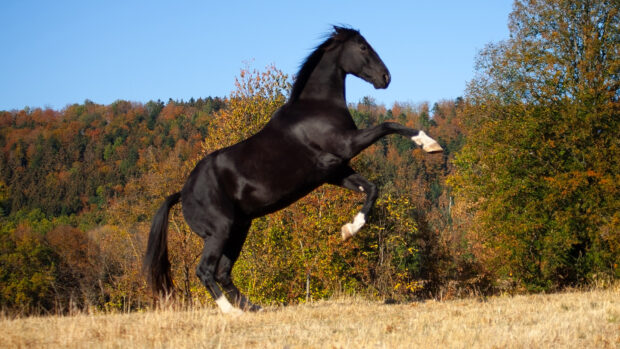THERE is, and will continue to be, enough horse feed for everyone, experts agree, as riders are urged not to panic-buy equine provisions during the coronavirus pandemic.
There are no reported shortages of horse feed or feed materials in the UK and buying in bulk, as has been reported, will only put pressure on manufacturers and could lead to waste.
British Equestrian Trade Association executive director Claire Williams told H&H she understands owners may be concerned about supplies.
“But if everyone buys exactly what their horses need – and stops panic-buying – there will be more than enough to go round,” she said.
“Snapping up feed and bedding in large quantities will not help and will only put unnecessary pressure on manufacturers, who are already working round the clock to fulfil stockist orders and meet customer demand. If everyone in the equestrian community can pull together at this challenging time, we will all be able to access our supplies in usual quantities, as and when we need them.”
James McCulloch is head of the feed sector at the Agricultural Industries Confederation, which has also had reports of panic-buying.
“I am in constant contact with feed mills, merchants, wholesalers and shippers and although there are some reported delays in delivery of a few feed additives, there are no issues for concern,” he said.
“My key advice is for customers not to panic-buy or stockpile, there are adequate supplies of feed. Increasing your normal requirements may only result in waste and increased costs.
“For peace of mind, please stay in contact with your local supplier, who is in the best position to provide up-to-date advice.”
Dodson & Horrell technical director Chris Gordon agreed there is “no need to panic”.
“Feeding animals, whether pets, horses or agricultural, is thankfully considered quite rightly to be an essential industry, which means your local feed store can remain open and feed manufacturers can continue to operate, while adhering to the regulations introduced to protect the health and wellbeing of their staff,” he said.
“This means that there is no need to order more feed than normal; in fact, if your horse’s workload is reduced, you will use less.”
Sue Moxon of R&R Country, which has stores in Selby and Welton, Yorkshire, told H&H the first week of social distancing was “absolutely crazy”.
“We had virtually nothing left on the shelves,” she said, adding that customers were bringing horseboxes to fill up with feed. And although the rush eased off slightly last week, “people’s buying patterns are all over the place; next week, it could be crazy again”.
Ms Moxon said the tack shop was closed but the feed barn remains open, although they are looking at shorter hours to minimise staff’s exposure, while adhering to government advice on social distancing.
Bedding supplies
SOME sawmills, from which shavings are sourced as a by-product, have closed.
But there are alternative bedding materials available, and companies that operate their own mills including Bedmax, whose managing director Tim Smalley told H&H his team can still source timber and is working at full stretch.
Continues below…

Coronavirus: Defra acts to quash rumours of vet medicines shortage
A Defra spokesman said coronavirus ‘has not caused any issues with the supply of veterinary medicines’ and the government has

Coronavirus: can my farrier still come to my horse?

Subscribe to Horse & Hound magazine today – and enjoy unlimited website access all year round
“I’d never been so busy, even before this situation,” he said. “We’d been working to improve quality and efficiency. I feel for customers, but we’re working 24 hours.”
Mr Smalley said he toured the Bedmax factories last week, sleeping in a tent to avoid contact, and the company has strict measures in place to comply with government guidance.
“I know it’s being worked on to include bedding manufacture as essential work – one would hope that would be the case,” he said.
“Our supply chain seems intact at the moment and we seem to be able to deliver.”
With the drier weather, many horses are also now moving to live out overnight so bedding demand should decrease.




